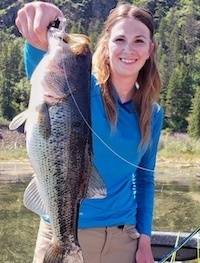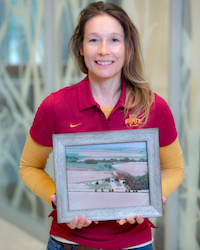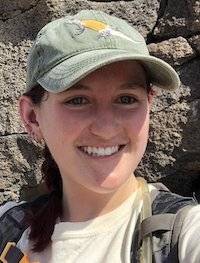2023-2024 Brown Graduate Fellowship Cohort Announced
Posted May 25, 2023

Posted May 25, 2023

Six Iowa State University graduate students have been selected to receive $60,000 in Brown Graduate Fellowship Program funding to support strategic university research over the next year.
Established in 2011 and administered by the Office of the Vice President for Research (OVPR), the annual Brown Graduate Fellowship Program is used to advance Iowa State research in the areas of study covered by the Valentine Hammes Family and Leopold Hammes Brown Family Trust, which include science, agriculture, and space science. Each year, an internal review committee selects a group of Ph.D. or master’s degree students from across the university to receive $10,000 each in institutional funding, which can be used to enhance existing fellowships, partially fund a fellowship, or assist with recruitment of new graduate students.
This year’s program was especially competitive, with only six out of 19 applicants selected to receive award funding by a committee composed of research faculty from across campus. Evaluation and selection of recipients for the 2023-2024 awards was based on nomination letters provided by candidates’ respective director of graduate education (DOGE).
“The Brown Graduate Fellowship truly embodies our institutional aspiration to be the most student-centric leading research university,” said Vice President for Research Peter Dorhout. “Graduate students are the lifeblood of Iowa State’s vibrant and thriving research community. We truly appreciate the continued support of the Valentine Hammes and Leopold Hammes Brown families that makes it possible for us to recognize and reward some of our institution’s most exceptional, high-achieving graduate students.”
 Recipient: Warren Rouse
Recipient: Warren Rouse
Degree Program: Biochemistry, Biophysics, and Molecular Biology, Ph.D.
Nominated by: Scott Nelson — Associate Professor of Biochemistry, Biophysics, and Molecular Biology
Nelson: “Warren’s research focuses on developing and improving bioinformatic and experimental approaches for druggable RNA motif detection; then connecting these tools to cheminformatics approaches that can rationally identify small drug-like compounds that bind RNA structure. This work is helping to advance the nascent field of RNA-based therapeutics that is poised to have a revolutionary impact on how we treat some of humanity’s deadliest diseases. His recent co-authored paper identified isoform-specific degraders of QSOX1, which has relevance to several human malignancies, including breast cancer. In every way, Warren is an exceptional graduate student; one who embodies ISU’s mission and values and who produces important and impactful work that helps raise our stature as a research institution.”
 Recipient: Madeline Lewis
Recipient: Madeline Lewis
Degree Program: Fisheries Biology, Ph.D.
Nominated by: Julie Blanchong — Associate Professor of Natural Resource Ecology and Management
Blanchong: “Maddie’s Ph.D. research at ISU, funded by the U.S. Army Corps of Engineers, is evaluating Walleye and Muskellunge behavioral ecology, escapement, and management options in Iowa reservoirs. These are important sport fish throughout the Midwest that represent critical economic and recreational resources, as anglers spend approximately 10.5 million days fishing in Iowa annually, representing approximately $500 million in economic activity. Maddie’s research is critical for developing management options to limit or offset the effects of escapement, improving reservoir fish populations and angling opportunities. Maddie has only been at ISU for a year and a half but has already demonstrated she is an exceptional and productive Ph.D. student through excellence in research, teaching, and service.”
 Recipient: Wei Chen
Recipient: Wei Chen
Degree Program: Geology and Environmental Science, Ph.D.
Nominated by: Elizabeth Swanner — Associate Professor of Geological and Atmospheric Sciences
Swanner: “Wei is conducting a comprehensive assessment of urban resilience in the face of climate change and urbanization. She is specifically researching current and future local climate change effects in the Des Moines metropolitan area and surrounding areas due to land cover changes. Her dissertation research will lead to innovative models and tools to help communities vulnerable to climate change. The outcomes have the potential to help policymakers improve cities’ abilities to withstand multiple shocks and develop equitable and proactive resilience planning. In addition to her research excellence, Wei serves the graduate programs she is a part of by serving three years as a graduate student senator and as the Vice President of the Environmental Science Graduate Student Organization.”
 Recipient: Denise Coberley
Recipient: Denise Coberley
Degree Program: Applied Linguistics and Technology, Ph.D.
Nominated by: Bethany Gray — Associate Professor, English
Gray: “[Denise’s] dissertation research seeks to enhance our understanding of how science is communicated to the public by different stakeholders, who may hold varied epistemological beliefs about the nature of scientific knowledge: scientists and lawmakers. By taking a linguistic approach to understanding the role of language in representing scientific knowledge, [Denise] intends for her research to inform training for scientists on how to effectively communicate science in public-facing contexts. Although her dissertation will focus on science communication during congressional hearings related to climate change, GMO food-labeling, and vaccines, the methods she develops during this research can be extended to a wide range of scientific topics or types of communicative events. [Denise] is motivated, efficient, and takes action to achieve her goals.”
 Recipient: Savannah Weaver
Recipient: Savannah Weaver
Degree Program: Ecology and Evolutionary Biology, Ph.D.
Nominated by: Amy Toth — Professor of Ecology, Evolution, and Organismal Biology
Toth: “Savannah’s record is impressive. For her M.S. work at California Polytechnic State University, she studied the physiological traits that make reptiles vulnerable to environmental change. She has already published three first author papers in competitive, peer-reviewed journals and has seven more publications in preparation. Over the past two years, Savannah has been awarded eight grants, with over $158,000 in funding. Assistant Professor Eric Riddell is recruiting Savannah to attend Iowa State as a Ph.D. student to study the effects of climate change on amphibians – one of the most threatened taxa on the planet. Savannah’s research will be integral to advancing research at Iowa State, particularly expanding frontiers in global climate change and understanding the biodiversity crisis. Savannah has one of the strongest records I have seen of any ISU graduate student applicant in 12 years.”
 Recipient: David Hall
Recipient: David Hall
Degree Program: Interdepartmental Genetics and Genomics, Ph.D.
Nominated by: Erik Vollbrecht — Professor of Genetics, Development, and Cell Biology
Vollbrecht: “In the research setting, David has built on his remarkable experience in co-leading the day to-day operations of the mosquito and tick surveillance program for the state of Iowa, which includes the identification and processing of [more than] 100,00 mosquito samples, the monitoring of invasive mosquito species, and managing over 1,200 samples for virus testing. In these activities, David demonstrated superb organization, attention to detail, and adept laboratory skills. As a result, David was lead author on a manuscript published in 2022 in a high-impact journal that covers all areas of natural science. Lead authorship on such a paper is a high achievement for an IGG student to reach at all during their graduate career, and David reached it in less than two years. David is a ‘gem’ of student with a great work ethic and driven by an unquestioned eagerness to learn.”